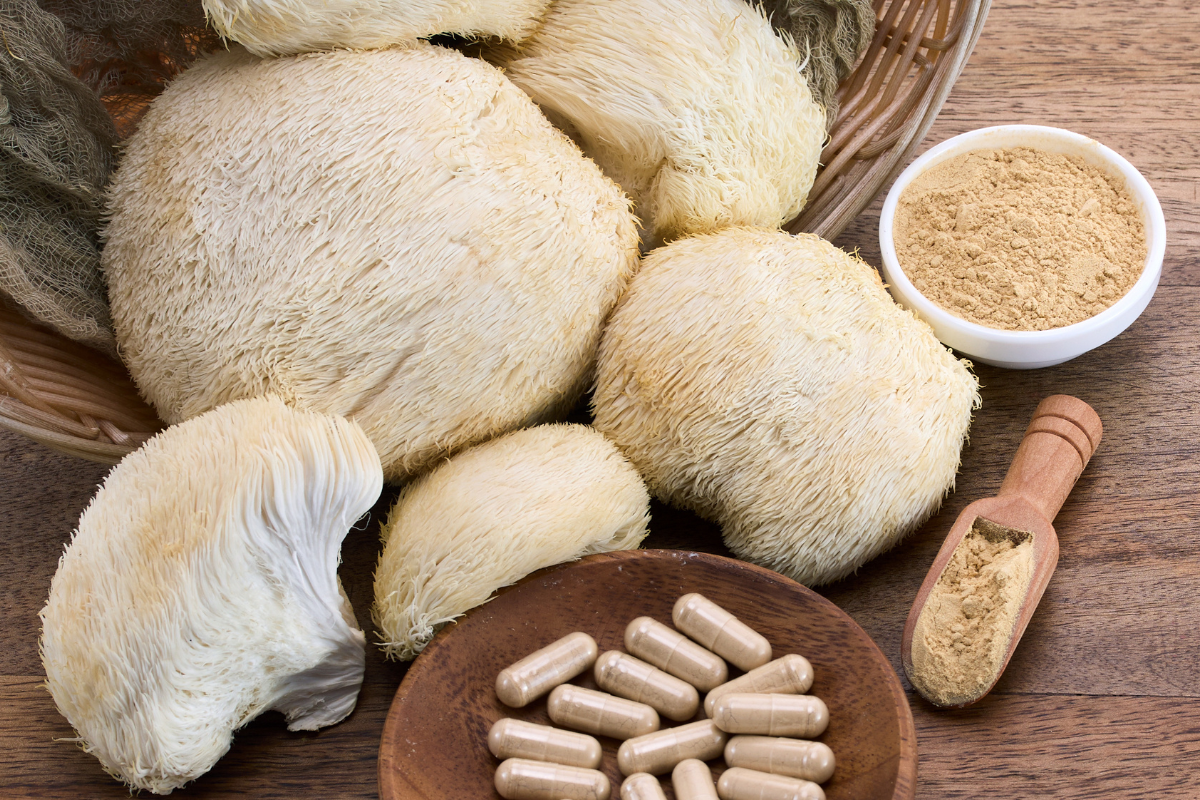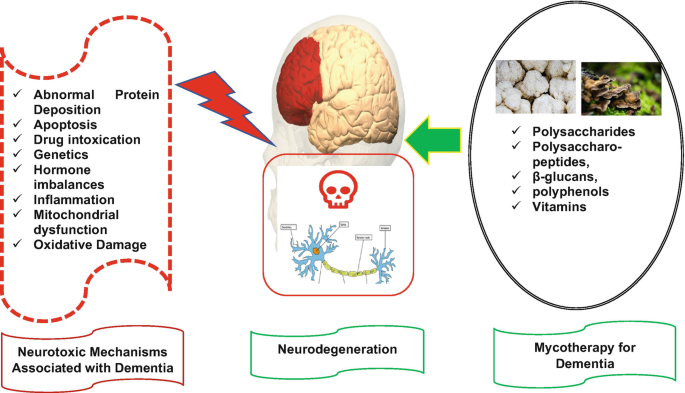Lion's Mane Benefits for Brain Health
Are you looking to develop a stronger brain and more energized body? The answer may lie in an edible and medicinal mushroom called Lion’s Mane powder (Hericium erinaceus). Native to many areas across the northern hemisphere including North America, Europe, China, and Japan, this unique looking mushroom has found a way into our medicinal toolbox as a remedy for several conditions and support for a healthy body, a healthy brain, and healthy emotions.
What is Lion's Mane Mushroom and What Are Its Uses?
Lion’s Mane powder (Hericum Erinaceus), also known as Hou Tou Gu, are large, white, and shaggy mushrooms that resemble a lion’s mane. For centuries they have been used in traditional Japanese herbalism by making it into a tea and using it as a tonic.
Lion’s mane mushroom extract boosts nerve growth factor (NGF), helping with neuron and brain tissue repair, maintenance, and regeneration. It can improve memory and concentration while supporting cognitive function and the nervous system. It contains high levels of beta-glucans (25%+) known for their immune-supportive properties, as well as antioxidants for cellular protection, and increased vitality.

Key Nutrients in Lion’s Mane
Before diving into the cognitive benefits, it’s helpful to understand what makes Lion’s Mane so powerful. It is rich in:
-
Hericenones (found in the fruiting body) – Promote NGF synthesis.
-
Erinacines (found in the mycelium) – Enhance NGF across the blood-brain barrier.
-
Polysaccharides – Support immune function and reduce inflammation.
-
Beta-glucans – Provide antioxidant and neuroprotective properties.
-
Ergothioneine – A rare antioxidant amino acid with cytoprotective effects.
Together, these compounds make Lion’s Mane a potent tool for brain health and neuroprotection.

Lion's Mane Mushrooms for Brain Health
It is evident that brain functions naturally slow down over time. The symptoms associated with aging such as cognitive decline, memory loss, and lack of focus have been linked to factors like shrinking neurons and damaged brain cells.
Research shows that Lion’s mane mushroom has the potential to promote brain health by stimulating the creation of Nerve growth factor (NGF) and Brain-derived neurotrophic factor (BDNF).
NGF and BDNF are proteins that stimulate the production of new cells and strengthen existing ones. NGF is also important in the formation of myelin, the covering around nerve cells that helps transmit impulses stimulating brain cells to do their job. BDNF increases brain pliability, helping the brain cells to maintain their integrity.
It is thought to contribute to our health in at least three ways:
Acting As An Antioxidant – In experiments at the cellular level, Lion’s Mane has demonstrated exceptional antioxidant potential.
Enhancing The Microbiome – Early evidence suggests that Lion’s Mane may contribute to gut microbiome diversity and overall gut health via a prebiotic effect on gut bacteria while studies at the cellular level demonstrate they have the ability to suppress unhealthy bacteria.
Nourishing Brain Cells – Compounds isolated from Lions’ Mane have been demonstrated at a cellular level to stimulate the production of NGF (nerve growth factor), a compound important for healthy neurons, while also potentially reducing overall brain cell inflammation.
While these are fascinating and promising findings, my primary interest always lies in whether or not they have yet translated into human studies – so let’s explore that next.

Alleviates Symptoms of Neuro-Degeneration
In 2008, a double-blind, parallel-group, placebo-controlled clinical trial found that lion’s mane effectively improved cognitive function in a randomized group of 15 older adults. Rodent studies found that the mushroom potentially protects against the effects of Parkinson’s and Alzheimer’s diseases, including involuntary movements and memory loss.
In an interview for Joe Rogan’s podcast, a mushroom guru and founder of Host Defense Paul Stamets stated that lion’s mane mushroom “helps to eliminate amyloid plaque as well as regenerate the myelin sheaths.”
Amyloid plaque is an acidic protein substance that has been linked to the destruction of cells and the breakdown of tissues. Myelin breakdown is a key component contributing to the symptoms of Parkinson’s and Alzheimer’s diseases.

How to Take Lion’s Mane for Brain Health
Lion’s Mane is available in various forms:
-
Powder (dried fruiting body or mycelium)
-
Capsules
-
Tinctures
-
Gummies
-
Brewed tea or coffee blends
Recommended Dosage:
-
General cognitive support: 500–1000 mg/day
-
Therapeutic or neuroregenerative support: Up to 3000 mg/day (under guidance)
Tip: Choose dual-extracted Lion’s Mane (both water and alcohol extraction) to ensure you get the full spectrum of active compounds—hericenones and erinacines.

Safety and Side Effects
Lion’s Mane powder is generally well-tolerated and safe for most people. However:
-
Mild digestive upset or skin rash may occur in sensitive individuals.
-
It’s best to consult your healthcare provider before using if you are pregnant, breastfeeding, or taking medications for diabetes or blood pressure.

Conclusion
Lion’s Mane mushroom extract stands out as one of the most powerful natural allies for brain health, offering a unique combination of cognitive, emotional, and neuroprotective benefits. From stimulating nerve growth factor (NGF) to supporting memory, focus, and emotional well-being, its impact is both scientifically backed and time-tested through centuries of traditional use. Whether you’re looking to enhance daily mental performance, protect against age-related cognitive decline, or support recovery from neurological stress, incorporating Lion’s Mane into your wellness routine is a smart, natural choice. With its excellent safety profile and growing body of research, Lion’s Mane is more than just a supplement—it’s a proactive investment in your long-term brain health and vitality.
References
- Mori, K., Inatomi, S., Ouchi, K., & Tuchida, T. (2009). Improving the effects of the mushroom Yamabushitake (Hericium Erinaceus) on mild cognitive impairment: a double-blind placebo-controlled clinical trial. Mar;23(3):367-72. doi: 10.1002/ptr.2634. Retrieved from https://www.ncbi.nlm.nih.gov/pubmed/18844328?dopt=Abstract
- Chiu C,H., Chyau C,C., Chen C,C., Lee L,Y., Chen W,P., Liu J,L., Lin W,H., Mong M,C. (2018). Erinacine A-Enriched Hericium erinaceus Mycelium Produces Antidepressant-Like Effects through Modulating BDNF/PI3K/Akt/GSK-3β Signaling in Mice. International Journal of Molecular Sciences. Jan 24;19(2). pii: E341. doi: 10.3390/ijms19020341. Retrieved from https://www.ncbi.nlm.nih.gov/pubmed/29364170
- Ryu S., Kim H,G., Kim J,Y., Kim S,Y., Cho K,O. (2018). Hericium erinaceus Extract Reduces Anxiety and Depressive Behaviors by Promoting Hippocampal Neurogenesis in the Adult Mouse Brain. Journal of Medicinal Food. Feb;21(2):174-180. doi: 10.1089/jmf.2017.4006. Retrieved from https://www.ncbi.nlm.nih.gov/pubmed/29091526
- Liu J., DU C., Wang Y., Yu Z. (2015). Anti-fatigue activities of polysaccharides extracted from Hericium erinaceus. Experimental and Therapeutic Medicine. Feb;9(2):483-487. Retrieved from https://www.ncbi.nlm.nih.gov/pubmed/25574220?dopt=Abstract
- Yang Y., Zhao C., Diao M., Zhong S., Sun M., Sun B., Ye H., Zhang T. (2018). The Prebiotic Activity of Simulated Gastric and Intestinal Digesta of Polysaccharides from the Hericium erinaceus. Molecules. Nov 30;23(12). pii: E3158. doi: 10.3390/molecules23123158. Retrieved from https://www.ncbi.nlm.nih.gov/pubmed/30513668
Send Inquiry
Related Industry Knowledge
- Phycocyanin E18: Nature's Blue Powerhouse Explained
- The Ultimate Guide to Creatine Monohydrate Benefits
- How long does it take DHA to work?
- Beta Caroteno
- Kids Benefit Using Pure Cod Liver Oil
- Benefits of the Milk Thistle to Liver
- Creatine Monohydrate Powder: High Quality Protein Nutrition
- How Black Carrot Extract Enhances Your Favorite Desserts
- What are the benefits of meso-zeaxanthin for eyes?
- What Does Creatine Do and Why You Should Use It for Muscle Growth


